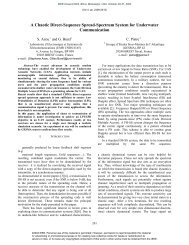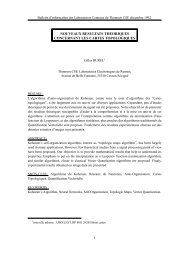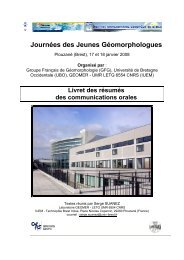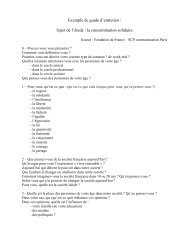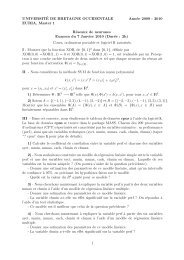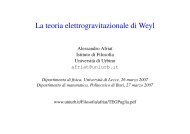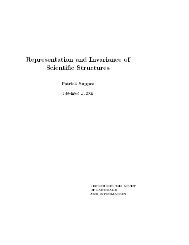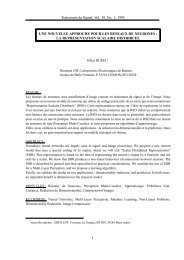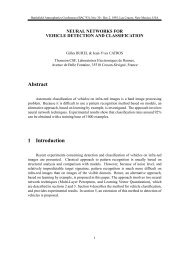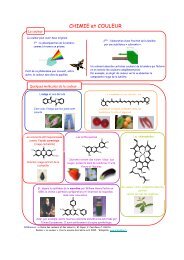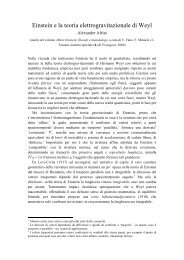Duhem, Quine and the other dogma
Duhem, Quine and the other dogma
Duhem, Quine and the other dogma
- No tags were found...
You also want an ePaper? Increase the reach of your titles
YUMPU automatically turns print PDFs into web optimized ePapers that Google loves.
<strong>Duhem</strong>, <strong>Quine</strong> <strong>and</strong> <strong>the</strong> o<strong>the</strong>r <strong>dogma</strong> 15<br />
Holism, which for <strong>Quine</strong> undermines meaning <strong>and</strong> hence analyticity, is <strong>the</strong>refore<br />
not entirely responsible for <strong>the</strong> cleavage repeatedly invoked by <strong>Duhem</strong> in his rejection<br />
of crucial experiments.<br />
It must also be said that ma<strong>the</strong>matics may not be as analytic as I have taken it<br />
to be; Kant <strong>and</strong> o<strong>the</strong>rs have regarded much of it as syn<strong>the</strong>tic. Kant (1787 B190)<br />
defines <strong>the</strong> syn<strong>the</strong>tic in terms of <strong>the</strong> principle of contradiction:<br />
Der Satz nun: Keinem Dinge kommt ein Prädikat zu, welches ihm<br />
widerspricht, heißt der Satz des Widerspruchs [. . . ]. Denn, wenn das<br />
Urteil analytisch ist, es mag nun verneinend oder bejahend sein, so<br />
muß dessen Wahrheit jederzeit nach dem Satze des Widerspruchs hinreichend<br />
können erkannt werden. 29<br />
And Poincaré ([41] Ch. I) writes that <strong>the</strong> règle du raisonnement par récurrence—<br />
which he considers <strong>the</strong> raisonnement mathématique par excellence—is irréductible<br />
(involving infinitely many syllogisms) au principe de contradiction, <strong>and</strong> hence is<br />
<strong>the</strong> véritable type du jugement synthétique a priori. Crowe [20] argues that ma<strong>the</strong>matics<br />
shares many of <strong>the</strong> difficulties attributed to physics in La théorie physique,<br />
<strong>and</strong> that <strong>Duhem</strong> attaches such weight to <strong>the</strong> distinctions of §III out of ignorance<br />
that ma<strong>the</strong>matics is not so certain <strong>and</strong> ‘analytic’ after all. Physics, by becoming<br />
more <strong>and</strong> more detached from <strong>the</strong> world, seems moreover to be losing its syn<strong>the</strong>tic<br />
character, <strong>and</strong> may have begun decades ago. The association of ma<strong>the</strong>matics with<br />
<strong>the</strong> analytic, physics with <strong>the</strong> syn<strong>the</strong>tic, could <strong>the</strong>refore be less straightforward<br />
than I have made it out to be. But again, definite resolution has not been my<br />
purpose; I have ra<strong>the</strong>r tried to explore <strong>the</strong> web of issues involved, <strong>and</strong> view in a<br />
fresh—perhaps questionable—light.<br />
8 Final remarks<br />
Troubling shades of grey have prevailed in <strong>the</strong>se pages over <strong>the</strong> reassuring certainties<br />
of black <strong>and</strong> white. I have often spoken of degree <strong>and</strong> nuance, of more <strong>and</strong><br />
less, ra<strong>the</strong>r than of sic et non, of true <strong>and</strong> false: holism is undermined but not completely<br />
eradicated, meaning acquires much definiteness, analyticity is recovered to<br />
<strong>the</strong> extent that holism is overcome <strong>and</strong> so on. But isn’t <strong>Quine</strong>’s point that analytic<br />
<strong>and</strong> syn<strong>the</strong>tic differ in degree <strong>and</strong> not in kind<br />
The gains in cruciality <strong>and</strong> analyticity with respect to <strong>the</strong> concerns of <strong>Duhem</strong><br />
<strong>and</strong> <strong>Quine</strong> may be a matter of degree, but that degree seems considerable, perhaps<br />
considerable enough to warrant representation as promotions ‘in kind.’ Indeed<br />
it can be misleading not to view certain differences in degree as differences in<br />
kind—<strong>and</strong> hence, for instance, not to call <strong>the</strong> unlikeliest events ‘impossible,’ to<br />
29 Translation: “Now <strong>the</strong> statement that nothing can have a predicate which contradicts it, is called<br />
<strong>the</strong> principle of contradiction [. . . ]. For if <strong>the</strong> judgement is analytic—be it negative or affirmative—its<br />
truth must always be adequately recognised by means of <strong>the</strong> principle of contradiction.”



